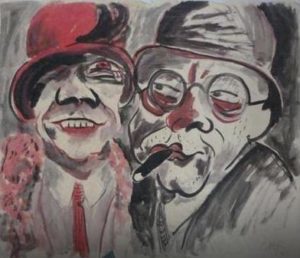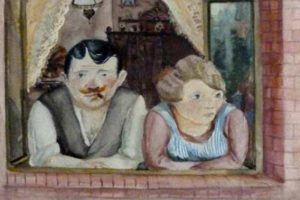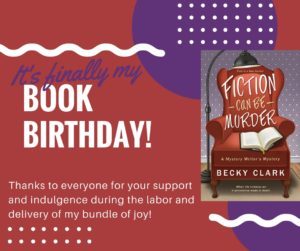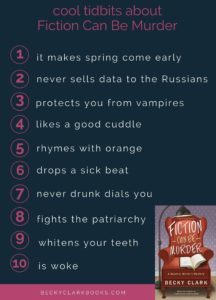Becky Clark's Blog, page 14
August 23, 2018
You’ve Got Mail
I recently hosted a big party with a large invitation list. It has caused me extraordinary curiosity about how people manage their calendars and other household paperwork.
Here’s the sitch … I’ve taken it upon myself to become an advocate, to a very small degree, for foster children. I’m pestering my friends for donations and this party was a fun way to gather backpacks filled with items kids might need when they’re suddenly whisked away from their homes. They go to school one day, only to be picked up mid-day by social services, perhaps never seeing their home or their stuff again. Or they get yanked from their homes with everything they own crammed in a plastic garbage bag.
This is unacceptable to me. Hence, the party. I gave everyone the particulars, and included a shopping wish list for the items to fill the backpacks.
Because of that, I thought it would be easier for people to have a paper invitation … party particulars on the front, wish list on the back.
But I’ve come to find out I’m quite the dinosaur in the way I manage my household. I am by no means a technophobe. I mean, I send and respond to e-vites, I maintain my website and blog, I’ve made Facebook my biyutch, I manage several different email accounts with several different providers, I read and have formatted ebooks, I text like a pro (although sometimes I have to squint), and I set up a GoFundMe for cash donations for the backpacks, for instance.
But I also send and receive mail through the US Postal Service.
So I sent these party invitations in the mail, and only one came back with a bad address. I’d been collecting addresses from people for a couple of months, knowing I was going to be doing this event. They willingly gave me their home addresses for what I referred to as my Party Invitation Database.
I asked for an RSVP because, duh … food. Almost half the people never responded at all, and many didn’t respond until I prompted them with an email.
And then I started getting messages asking me to re-send the info because they couldn’t find it.
I happily sent it, of course, but was a bit flummoxed. At my house, when I get an invitation to something, whether on paper or electronically, I read it. If it sounds like something I want to do, I check the calendar hanging on my kitchen wall. If I’m free, I write it in and RSVP to the host. If there are any details I need to refer back to, I poke the invitation on the nail that holds my calendar. If I’m not free or don’t want to go, I send my regrets to the host. All within a day or two of getting the invitation. Sometimes, I put the invitation in the place where I keep my bills, where I’m sure to see it every week or so.
I don’t need any judgy comments about my undying love for the low-tech paper and pencil, and I don’t mean to be judgy about people who completely eschew their simple elegance, but I reserve the right to give you a side-eye as necessary.
I will, however, harshly judge people who don’t RSVP to a party. Is there any reason for that except extreme rudeness? And seriously, I’m asking. I don’t want to think poorly about people, especially my friends!
But I’ve really gotta know … what do you do when you get invitations or other household paperwork that needs action taken upon it somehow?
You can comment here, mail me, fax, send a telegram, attach your wee note to a carrier pigeon, or use semaphore. You could even call me on my rotary-dial landline. But please, enlighten me as to how you do this.
August 20, 2018
Becky Clarks Of The World … Unite!
I basked today in the glamour of my writerly life because I did extensive research into the varieties of packing tape and the pros and cons of each to set a scene in a package shipping store. I also dove headlong into the Theme from Shaft today for a 23-word stream of consciousness joke.
All for Important Writing Purposes.
To put the icing on the razzle-dazzle of my glamorous day, I also received these Google alerts. I’ve placed alerts on my name, my titles, and snippets of text to notify me when anyone mentions me or my books online or tries to pirate them.
These alerts keep me humble. They are never about me.



But I’m thinking of gathering all the Becky Clarks of the world together for a barbeque. It’ll be so exciting to find myself in the midst of all that fame and glory. And maybe we can get Becky to cater it!
August 13, 2018
First Drafts, Revisions, and Rainbow Flamingos
A couple weeks ago I finished the first draft of METAPHOR FOR MURDER, the third book in my Mystery Writer’s mysteries.
Here are the final, first draft stats:
Total words: 59,173
Total hours: 54
Total writing days: 24
Average words per hour: 1,096
Total pages: 210
I learn — or relearn — something with each manuscript I write. Two things got my attention this time.
One, I should have gone back to read pertinent parts of FICTION CAN BE MURDER to reacquaint myself with some characters I hadn’t seen in awhile. I took too much of my writing time trying to remember the nuance of some of my people. It bogged me down and zapped my momentum.
Two, my vision for the final showdown was weak. And this actually happens all too often. I think, because the story is so much in my head that I expect I know the blocking of the scene better than I really do. I need to take more time with the minutiae of important scenes like this. Again, it slowed me way down and annoyed me.
Now I’m well into the revision stage. This is where I fill in all the blanks I left. When I’m writing the first draft, instead of going backward to find and fix something I’ve already written, I leave notes to myself … He should have called her at some point during the day …… check the timeline, should it be dark yet?
I also write some fairly boring sentences, with a lot of bland or repetitive words, passive verbs, and incomplete description.
If I can’t immediately come up with the right words, I use placeholders like —
I was dug in like a [ ]
She made [frustration noises]
[Describe the room, mentioning the worn spot in the carpet]
Then during Phase Two, when I make that first revision pass-through, I know I have to plug those holes or look up some minor research question right away. I have to stop and determine what Peter O’Drool’s squeaky toy is going to look like (rainbow-colored plush flamingo, for those of you playing along at home). I have to look up potentillas to remind myself what color their flowers are (yellow). I have to decide on all the questions those toddlers are going to ask before I move on (so … many … questions!).
Even though it slows me down in Phase Two.
But by the time I get all that done through the entire manuscript, I get to go back to page one, this time grounding the reader in the story using all the senses, adding layers of theme and emotion, making the funny bits funnier, the mystery bits more mysterious, the clues more hidden or maybe more visible, the writing more vibrant.
It sounds like work, but what do they say about doing a job you love? You’ll never work a day in your life.
Remind me of this when I’m in full-fledged tantrum mode, hating both my book and myself.
Do you keep statistics on your progress for anything? Do you find it as comforting and as fascinating as I find my stats? Do you think it keeps you on track or otherwise benefits you? I also track my weight first thing every morning and I know that keeps me a bit more honest with my food choices during the day.
August 6, 2018
Conan Doyle For The Defense by Margalit Fox

I just finished this fascinating true crime story involving none other than Arthur Conan Doyle.
Over the years I’d heard that people would write to Conan Doyle and ask his help on various legal or criminal matters but I thought that was anecdotal, since people also thought Sherlock Holmes was a real person.
But this is one of those actual cases.
A man named Oscar Slater was jailed for the murder of an elderly woman in Scotland in 1908. But the investigation was a sham and it was clear that Slater was railroaded. Slater was a convenient person to nab … Jewish, foreign, poor, held dodgy jobs. He checked all the easy boxes and was sent to a brutal place, Peterhead Prison, just north of Aberdeen on the northeast coast of Scotland. He was there for eighteen years.
The author very adeptly travels back and forth between Slater’s case and the investigation, the history of law and police procedures in general and in Scotland in particular, and how Conan Doyle created Sherlock Holmes. It’s pretty clear Sherlock was based on Joseph Bell who was a doctor at a teaching hospital. As a second year medical student, Conan Doyle was chosen to be his clerk. Bell diagnosed illnesses exactly as Sherlock solved crimes.

The influence of Sherlock Holmes and Arthur Conan Doyle led to new ideas we still use today in police work, but fair warning, the things they did to Oscar Slater will make your blood boil.
This book was a delightful combination of police procedural, biography, history, and plain ‘ol mystery. It also taught me the difference between deductive, inductive, and abductive reasoning.
Sherlock would be proud.
What are you reading?
July 19, 2018
The Real Truth
Mostly I hang out with other writers or people who absolutely don’t care that I’m a writer. (I’m looking at you, Dad.) But occasionally I find myself in the company of someone who thinks I am simply fantastic for no other reason than there are books published with my name on them.
It inflates my ego more than a summer supply of beach toys.
But that doesn’t last long, for I know the truth about my “glamorous writer’s life.”
For instance, I know that sometimes I must hand-deliver a sandwich bag full of dog poo to the vet’s office.
And that is not a glamorous dog I own, either. Trust me.




July 17, 2018
Numbers, Numbers, Numbers
I’m in the middle (figuratively, not literally) of writing book #3 of my Mystery Writers Mystery series. This one is tentatively titled METAPHOR FOR MURDER.
I’m an outliner, so before I start the day’s writing, I read the pertinent section of my synopsis and timeline, then the last few lines of what I’ve completed of the manuscript and off I go. I keep track of my progress from day to day, setting my timer for one-hour increments, not just because it makes the math easier, but because it reminds me to stretch and move around a bit. For a sedentary job, writing is fairly physical! I rarely write more than three hours per day, and I take off weekends and Wednesdays.
Here are the current stats after 20 writing days:
total words: 50,030
total pages: 177
average words per hour: 1095
average words per hour one: 1105
average words per hour two: 1135
average words per hour three: 1093
best hour: 1426 words
worst hour: 853 words
My least productive writing day was July 6th. I spent too much time trying to reacquaint myself with some recurring secondary characters, the members of Charlee’s critique group. They made no appearance in book #2 (which is already written and with my editor), since FOUL PLAY ON WORDS is set at a writer’s conference in Portland instead of where they live in Colorado, so I haven’t hung around them for a couple of years. I’ve missed them!
But knowing a critique group scene was coming up, I should have revisited my character pages for each of them, then read the synopsis, and then taken a shower or walked on the treadmill or even just sat with my coffee and mulled over how I envisioned the scene and all of them in it. I shouldn’t have taken away from my production time by doing pre-production work. Lesson learned.
Writing is much more fun when it’s fast and easy.
Go figure!
July 10, 2018
Backpack Party
Did you know that foster kids often have to carry all their belongings in garbage bags? And that when they enter the system it’s almost always abrupt? Sometimes they’re picked up directly from school and they never see their home or their stuff again. Can you imagine?
The image of these kids toting their possessions in black plastic bags haunts me.
These days I feel helpless, and a bit hopeless, in a million different ways. The problems of the world are too overwhelming. The solutions too elusive. The outcomes too critical.
But these kids. And their garbage bags. That’s a problem I realized I could help fix, at least for a few of them.
A little legwork connected me with a couple of organizations in Colorado, where I live, as well as a national group. They’ve become my liaisons between donations and the caseworkers who interact with the kids. I learned that a backpack with just a few items made a world of difference to these kids.
I’ve started a GoFundMe page to raise money and I’m having a party toward the end of July to collect up backpacks and items these foster kids need when they enter the system.
I’ve asked guests to bring backpacks and/or items from the wish list. The party is just a fun, family-oriented celebration with a taco bar, tournaments in giant-sized team Scrabble, bean bag toss, men vs women trivia, and more. Then after the party, I’ll use the GoFundMe donations to supplement the items and backpacks.
Filling a backpack for a newly displaced foster kid is not overwhelming or elusive, like most issues in the world these days. It’s something I can do. And you can do. It won’t solve the problems that foster kids face, but it will make it easier for them to muddle through those early days with a new pair of pajamas, a toothbrush, a book, and a toy.
We can’t do everything, but we can do something.
Please share this and the GoFundMe page and let’s see how many foster kids we can help.
I plan to make this an annual event, but I think I need a better name for this party. Comment with your entry, and if I think it’s the best, I’ll donate $50 in your name to the GoFundMe page AND send a signed copy of my book FICTION CAN BE MURDER to anyone you want.
Let’s do this thing!
Becky
July 3, 2018
I’m reading Nancy Pickard this week
I’m a proud, dedicated member of Sisters in Crime, an organization whose mission it is to support women mystery writers. (Misters do this too, in case you were wondering!) I helped start our Colorado chapter a few years back. It has been by far one of the best things I’ve ever done, personally and professionally.
Members get lots of benefits from the national organization of SinC, but I’m wiggly with excitement about something coming up in a couple of weeks. National has created a Speaker’s Bureau of prominent and prolific Sisters in Crime members. At no cost to the chapter, they pay for these speakers to come and present workshops and other events for us.
The board of our chapter requested that Nancy Pickard come to speak to us so I’m fully immersing myself in her mysteries.
I started with THE VIRGIN OF SMALL PLAINS, which hooked me from the first few pages.

Here’s the blurb about it…
Small Plains, Kansas, January 23, 1987: In the midst of a deadly blizzard, eighteen-year-old Rex Shellenberger scours his father’s pasture, looking for helpless newborn calves. Then he makes a shocking discovery: the naked, frozen body of a teenage girl, her skin as white as the snow around her. Even dead, she is the most beautiful girl he’s ever seen. It is a moment that will forever change his life and the lives of everyone around him. The mysterious dead girl–the “Virgin of Small Plains”–inspires local reverence. In the two decades following her death, strange miracles visit those who faithfully tend to her grave; some even believe that her spirit can cure deadly illnesses. Slowly, word of the legend spreads.
But what really happened in that snow-covered field? Why did young Mitch Newquist disappear the day after the Virgin’s body was found, leaving behind his distraught girlfriend, Abby Reynolds? Why do the town’s three most powerful men–Dr. Quentin Reynolds, former sheriff Nathan Shellenberger, and Judge, Tom Newquist–all seem to be hiding the details of that night?
Seventeen years later, when Mitch suddenly returns to Small Plains, simmering tensions come to a head, ghosts that had long slumbered whisper anew, and the secrets that some wish would stay buried rise again from the grave of the Virgin. Abby–never having resolved her feelings for Mitch–is now determined to uncover exactly what happened so many years ago to tear their lives apart.
Three families and three friends, their worlds inexorably altered in the course of one night, must confront the ever-unfolding consequences in award-winning author Nancy Pickard’s remarkable novel of suspense. Wonderfully written and utterly absorbing, The Virgin of Small Plains is about the loss of faith, trust, and innocence . . . and the possibility of redemption.
As soon as I finished that one, I cleansed my palate with the last three short stories from an anthology by one author that was disappointing so I won’t mention it. It was touted in a national magazine, and as I’ve been trying to write a short story, I thought it would be wise to read really good ones. Alas, these I did not find “really good.” The search continues, however.
Then I picked up Nancy Pickard’s THE SCENT OF RAIN AND LIGHTNING.

Here’s the blurb for it…
One beautiful summer afternoon, Jody Linder receives shocking news: The man convicted of murdering her father is being released from prison and returning to the small town of Rose, Kansas. It has been twenty-three years since that stormy night when her father was shot and killed and her mother disappeared, presumed dead. Neither the protective embrace of Jody’s three uncles nor the safe haven of her grandparents’ ranch could erase the pain caused by Billy Crosby on that catastrophic night.
Now Billy Crosby is free, thanks to the efforts of his son, Collin, a lawyer who has spent most of his life trying to prove his father’s innocence. Despite their long history of carefully avoiding each other in such an insular community, Jody and Collin find that they share an exclusive sense of loss.
As Jody revisits old wounds, startling truths emerge about her family’s tragic past. But even through struggle and hardship, she still dares to hope for a better future—and maybe even love.
Again, as with Pickard’s other book, I was immediately captivated. She has a distinctive way with language, and her descriptions are so spot-on, you could swear you’ve already been wherever she’s describing.
Here’s how it opens …

Pickard has tantalizing mysteries and story questions that I can’t wait to learn. I raced through 100 pages of it on a lazy Sunday afternoon. I’m only halfway through, but I suspect I’ll continue to be surprised and engrossed through the last word.
Are you a Nancy Pickard fan? In addition to these two books, she has 16 others. Have you read any others?
May 7, 2018
Research and The Iceberg Theory
I joke that I write amateur sleuth mysteries because I hate research. But what I mean is that I hate the kind of research that readers get mad at you for. Like if I get a fact wrong about guns, or police procedure, or the exact layout of a city.
But I love all the other kind of research, that which informs the plot or adds a layer you didn’t even know you needed. Or, heck, even something that’s just delightful to learn about, even if you don’t end up using it in your story!
Here are some things I’ve been lucky enough to get to research lately for a couple of my works-in-progress:
diner lingo
mob trivia
costs involved in putting on a one-day event with catering
disguises
pugs
hair extensions
small claims lawsuits
Colorado mountain resorts
dog agility competitions
Obsessive Compulsive Disorder
crossword puzzle creation
In FICTION CAN BE MURDER I learned more about the art stolen by the Nazis during WWII. There’s a movement now to determine provenance of many pieces of important artwork and reunite them with their rightful owners. It’s a complicated task, as you can imagine. It involves most of the great museums in the world who are now tasked with investigating their collections to see if they are in possession of any of these looted works of art. But even if they determine the rightful ownership of the paintings, it’s often impossible to repatriate them because many of the families stolen from were destroyed during the war. There’s no one left to take possession of the art.
Hitler and the Nazis purged and confiscated anything they deemed to be “degenerate” art, mostly from Jewish citizens and art dealers and other enemies of the Reich. Some paintings were sold to other nations to raise capital for the Nazi war machine. Some were usurped for the private collections of highly placed Nazis. The rest was sent into storage in caves to hide them from the Allies.
George Clooney’s movie “The Monuments Men” is based on this story.
In FICTION CAN BE MURDER, there’s a visit to the Denver Art Museum with an exhibit of many of the looted works. It’s just a small part of the plot, but I found it a fascinating rabbit hole to dive into.
During my research quest, I was searching for specific subjects of paintings, and stumbled into the looted art stories. These are the paintings I refer to in the story.
“Couple” by Hans Christoph

and “Man and Woman” by Wilhelm Lachnit.

I love the stylized look of these two paintings — as did Charlemagne “Charlee” Russo, my sleuth — and it was exactly what the story needed.
The story behind the paintings was exactly what *I* needed. Stumbling upon fascinating stories is what keeps my brain clicking away.
It didn’t really fit in FICTION CAN BE MURDER to take a long detour into the land of looted artwork, and I’m reminded of the “Iceberg Theory of Writing.” The tip of the iceberg is what you show your readers. But everything underneath the water is what the author knows. All that research. Your characters’ habits, likes, and dislikes. Backstory. It’s all under there, floating around.
As a reader, do you like to learn tidbits in your novels? What’s something you’ve learned recently? As a writer, is it difficult to know when to stop researching a subject that fascinates you? How do you know how much to include in your novel?
April 9, 2018
Fiction Can Be Murder
Launch Day is finally here!

In case you haven’t heard enough about FICTION CAN BE MURDER, here’s an interview I did with Deborah Kalb … here’s where the main character Charlee Russo drops in at Dru’s Book Musings for a bit … here’s my book trailer … here are some cool tidbits you might not have known about the book …

And because you’ve been so patient, here is a picture of my adorable dog, Nala eating a MilkBone as big as her head.

And her boudoir shot …

You can buy the book, but not the dog, at Amazon, Barnes & Noble, and independent bookstores everywhere. And if you don’t want to buy it, ask your favorite librarian to order it. (Because then they’d be MY favorite librarian too!)
And remember … when you subscribe to my “So Seldom It’s Shameful” newsletter, you get the chance to win books and other cool stuff. Do it now because — SURPRISE — this month you can win FICTION CAN BE MURDER!
Good luck!



